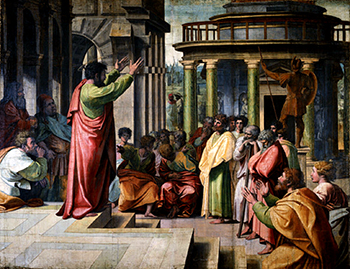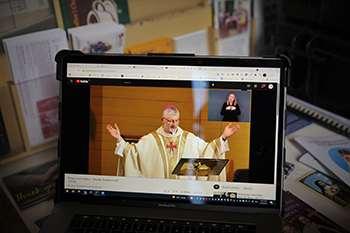In a previous article from the February edition of The Bridge, the idea of evangelisation within digital culture was first discussed through the understanding that the Church engages best with any culture through a process of prophetic dialogue. It was stated that “the dialogical aspect of mission recognises that the missionary does not bring God with them to the new culture; God is already there.”
This then requires the Church to recognise the goodness and giftedness of digital culture and to engage with this culture from within. An aspect of digital culture that reflects the goodness of the Trinity is its interconnectivity, how it connects individuals and brings them together. All the faithful are urged to recognise that their Christian discipleship does not exclude their behaviour online and that they must witness and proclaim the Gospel message amidst the digital culture as much as anywhere else.
The Church is called, at this time in human history, to allow the digital culture in, to learn from it and engage with it. At the same time, the Church (and I mean the whole body of Christ, lay and ordained) is called to witness to the Gospel through digital means and allow the Gospel to prophetically dialogue with digital culture.
The process of prophetic dialogue, as mentioned previously, “promotes dialogue between the culture and the Gospel, whilst prophetically challenging aspects of the culture which may be contrary to the Gospel.” Mission as prophetic dialogue must be comprehensive and diverse, allowing the Word of God to become flesh in all manner of cultural realities and situations.
We see in the story of Pentecost, that we celebrated in our churches only recently, that the disciples, the gathered Church being born by the Spirit, were able to proclaim the Good News of Christ in many languages so that all manner of peoples could hear and engage with the messaged being preached. Pentecost is a timely reminder for us, the Church today: are we speaking in all different languages? Are we interpreting and sharing our message of truth in a variety of ways so that we can reach all different kinds of people? How are we preaching the message of Jesus Christ in a digital language?
Evangelisation, in the model of prophetic dialogue, always involves inculturation – the process whereby a missionary enters into another culture and learns its values from within. A missionary, an apostle, a Christian, must always be ready to listen and to learn. We must listen before we preach, otherwise we may be preaching in the wrong language, in the wrong way, to the wrong people.
 A great example of this is when St Paul goes to preach to the people of Athens. Standing in the Areopagus, the centre of cultural and political debate, Paul points out that these pagans have erected altars to all sorts of gods, including one to “an unknown God”, and Paul uses this concept, familiar to the people of Athens, to preach about the one, true God and his son, Jesus Christ.
A great example of this is when St Paul goes to preach to the people of Athens. Standing in the Areopagus, the centre of cultural and political debate, Paul points out that these pagans have erected altars to all sorts of gods, including one to “an unknown God”, and Paul uses this concept, familiar to the people of Athens, to preach about the one, true God and his son, Jesus Christ.
Now, not everyone in Athens believed Paul. The Scriptures say that some even sneered at him about the idea of resurrection. But there were several converts who followed Paul on his journey to Corinth. Paul took the time to immerse himself into the Greek culture and to notice something good and true and beautiful in their culture that could help him speak to them about the one, true God.
Coming to our Australian context and particularly the ever-increasing digitalisation of our Australian culture, the Church must recognise that there is inherent good in the gifts of digital culture today. We must enter into that culture, become one with that culture, in order to be the presence of Christ in that culture. We need to stop seeing digital media as merely a tool for evangelisation. Our viewing of digital means for their utility is undermining our mission in that space.
For example, a parish which creates a Facebook page and enters into that particular digital culture only for the purpose of pushing its own agenda of telling people what to believe and that they should come to church is going to be limited in its effectiveness because that parish has not bothered to engage with the culture or to dialogue with it. It is operating as if it still exists outside of that culture and it is colonising that culture with its own message, rather than firstly listening to the needs of that culture and engaging in dialogue with it.
Because of our waning numbers of attendance at Mass and the diminishing number of vocations and the ever-depleting coffers of our parish and diocesan accounts, we are too eager to engage people in dialogue and we rush headstrong into battle, forcibly making people see our point of view. This method of evangelisation appears desperate and weak. It also appears rude; it does not take the time to get to know the other culture and to speak its language. It’s like an arrogant tourist monopolising off another culture and refusing to learn their language or customs and demanding they get what they want.
 There is a lot the Church can learn from digital culture and there is a lot the digital culture can learn from the Church. This concept of prophetic dialogue must be at the centre of the Church’s mission. Every parish, school, youth group or other Church ministry must place prophetic dialogue at the heart of their plan of evangelisation.
There is a lot the Church can learn from digital culture and there is a lot the digital culture can learn from the Church. This concept of prophetic dialogue must be at the centre of the Church’s mission. Every parish, school, youth group or other Church ministry must place prophetic dialogue at the heart of their plan of evangelisation.
When we consider how we witness to our faith, do we bombard those on social media with quotes from the Bible or the Catechism? Or do we ask questions and invite responses that can open conversations, build dialogue and begin relationships?
When we consider how we worship and celebrate sacraments, do we just transmit our services outwards like mass media so people can sit and watch and not participate in our deeply sensory and incarnated liturgy? Do we consider whether Mass and other sacramental celebrations can actually be fully translated online? Or are they so incarnational that they should only be celebrated in the flesh? Do we engage digital culture in other forms of prayer? Or do we utilise the interconnectivity of digital spaces to invite people to engage with worship in a more personal manner?
When we consider the faith formation programs of our parish, do we bother to think about how we can elevate the experience through the addition of digital means? Do we consider that the presence of our faith groups online could be a prophetic witness to others and a possible place of dialogue with those who are searching for more? Where there is a lack of faith formation, do we consider the impact that digital culture will have when people have access to endless sources of unchecked and unauthorised information? Or do we engage with digital culture in a way that builds connection between those who lack faith formation with those who have the skills to provide it?
When we consider our charitable works and the outreach of so many great Catholic organisations, do we consider how these works can be translated to digital spaces? Do we only utilise digital culture for the raising of funds? Or do we also identify the poor and marginalised in those digital spaces and reach out to them as well? Do we think about those who are ‘digitally poor’? Do we dialogue with digital culture in a way that challenges those immoral aspects of the digital world and helps to bring the digital culture into works of justice, peace and integrity of God’s creation?
When we consider how we relate to other’s online, are we mindful of the cultural complexities of the digital platforms? Are we aware of the algorithms and the echo-chambers that often work against the process of dialogue by forcing us to only communicate with those who are like us? Or do we consciously and intentionally go out beyond the boundaries of our algorithms to dialogue with those who are different from us? Are we conscious of the online/offline divide that often permits people to act in horrible ways online? Do we consider our behaviour, our language, our customs in the digital spaces that promote mercy, forgiveness and healing reconciliation of Christ?
The mission of evangelisation as prophetic dialogue can never only focus on one part of the life of the Church. Our dialogue with digital culture cannot be limited to thinking only about putting Mass online or making a parish website. We must be comprehensive with our plan for evangelisation and consider all the different aspects of the life of our Church and how each facet of Church life can dialogue with digital culture. In this way we will be more effective in our mission to spread the Good News to all the corners of the earth.
 Fr Joshua Nash OMI is the assistant priest as St David’s Parish, Tea Tree Gully, in the Archdiocese of Adelaide. As part of his studies, Fr Nash completed a master’s thesis exploring how the Church can understand its mission in the digital world.
Fr Joshua Nash OMI is the assistant priest as St David’s Parish, Tea Tree Gully, in the Archdiocese of Adelaide. As part of his studies, Fr Nash completed a master’s thesis exploring how the Church can understand its mission in the digital world.
Links
Towards Full Presence: A Pastoral Reflection on Engagement with Social Media (Dicastery for Communication, 2023)
Images: St Paul Preaching at Athens by Raphael (Wikimedia Commons). Mass during the Fifth Plenary Council of Australia, streamed from St Kilian's Church, Bendigo on October 4, 2021 (Diocese of Sandhurst).
Words: Fr Joshua Nash OMI



